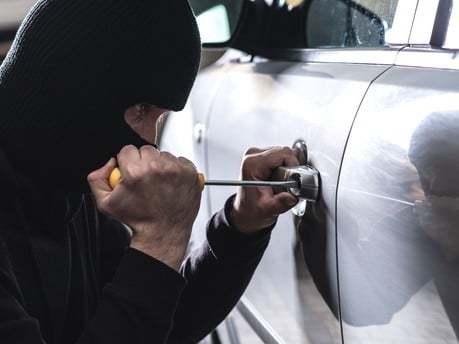What to do if Your Vehicle Has Been Stolen
How to report car theft and find out what happens if it is found
It’s the nightmare every driver fears; waking up to find their vehicle has been stolen. If the worst should happen and you find yourself the victim of vehicle theft, what’s the first thing you should do and the best course of action to take?
In this article dedicated to the topic, here at Wilsons Epsom, we advise what to do if your vehicle has been stolen, how to report it, and where you stand in terms of an insurance payout. Read on to find out more…
Has your vehicle been stolen?
Before you go into panic mode and call the police, it’s important to DOUBLE-CHECK that your vehicle really has been stolen. By this we mean the following:
- Was your vehicle parked where you thought it was? If you share your car with a partner or family member, then check in case they moved it for any reason.
- Was your vehicle parked illegally? If so, it could mean that your car was towed away by the council. If you’re based in London, you can check this by contacting TRACE.
If you’re confident that your vehicle really has been stolen, then we’ve listed what steps to take next…
How to report your vehicle as stolen
First thing’s first; although naturally you may become upset and distressed to realise your vehicle has been stolen, try not to panic. You’ll need a clear head in order to alert the police and provide them with all the information they’ll need to try and locate your vehicle.
To help, here’s our step-by-step guide on how to report your vehicle as stolen:
Step 1 - call your local police station
You should only dial 999 in an absolute emergency, so if your vehicle has been stolen overnight it's best you dial 101 and ask to be put through to the nearest police station.
They will need the following information:
- Your vehicle’s registration number
- The make and model of your vehicle
- The colour of your vehicle
You will be asked where and when the vehicle was last seen and if you’d noticed anything suspicious prior to it being stolen. If your property has CCTV or a doorbell with a camera, alert the police so that they can view the footage as part of their investigation. Let them know if your car has a black box or GPS tracking device which may help them to recover your vehicle quicker.
Following an initial call, you will be issued with a crime reference number which you’ll need to hand during the investigation and for your insurance company. The police will register the theft of your vehicle with the DVLA (we explain more about this further down in the article).
Try and think about any belongings you had in the vehicle and the value of those items. Any photos you have of the vehicle will prove useful to the police and you’ll need to let them know if anyone else had access to the vehicle or the vehicle’s keys, and where you kept them.
Step 2 - contact your insurance company
The second most important call you need to make is to your insurance company so you can alert them to the vehicle theft. They will ask for the crime reference number and will talk you through making a claim - we go into more detail about this in the next section.
Step 3 - contact the lender and/or registered owner
It may be that you’re not the owner of the stolen vehicle. If the vehicle has been hired, leased, or you have outstanding finance against the car, you will need to contact the lender and/or registered owner of the vehicle.
Any party with financial interest or ownership of the vehicle will need to be informed immediately and be put in touch with your insurance company. They will advise you of the further steps you need to take and any other information needed.
Step 4 - gather all your vehicle information
Once you’ve logged the vehicle theft with the police and informed your insurance company, we’d recommend you gather all the information you have to hand about your vehicle.
From your service book to service records, the vehicle identification number (VIN) and any details regarding vehicle upgrades (if applicable). As we mentioned above, photos or videos of the stolen vehicle are really helpful to the police.
Does insurance cover a stolen car?
Once you’ve informed the police that your vehicle has been stolen and have a crime reference number, you then need to alert your insurance company. Check your motor insurance policy to see if it covers the cost of a replacement vehicle. If you pay your insurance premium by monthly instalments, it may be that you have to pay off the remainder of the policy before you can make a claim.
How long does it take for an insurance company to pay out on a stolen car?
Depending on the circumstances of the vehicle theft, your insurer may wait to pay out on any claim you make to firstly see if the vehicle is found and in what condition. In some cases, the insurer may pay out but will keep your vehicle if it is found.
It’s worth noting that if and when your insurer pays out, it may end the existing policy. If not, your insurance premium may go up the following year - check the terms and conditions of your policy to confirm if this is the case.
If you’re unsure of your rights as an insured driver, head over to the Citizens Advice website for further information about vehicle insurance and where you stand if your vehicle has been stolen.
Will you get a courtesy car if your vehicle is stolen?
Check your motor insurance policy to see if you are eligible for a courtesy car should yours be stolen. Even if you have comprehensive car insurance with a reputable insurer, there is a high chance your policy won’t cover the cost of a courtesy car if you’re a victim of vehicle theft.
Do you need to tell the DVLA if your car is stolen?
As we mentioned towards the beginning of the article, the police will automatically inform the Driver and Vehicle Licensing Agency (DVLA) if you report your vehicle as stolen. But, we’d always recommend you follow this up by getting in touch yourself - especially if you have a personalised number plate and an insurance payout - which we explain below:
If you have a personalised number plate…
It may be that you have a personalised number plate you wish to keep, so you’ll need to inform the DVLA of this. If your car is recovered safe and sound, then the personalised number plate is still registered and usable with that vehicle. If the car is not found and an insurance payout enables you to purchase another vehicle, then you won’t be able to transfer the registration of the personalised plate for at least six months.
If your insurance company pays out…
Assuming your insurance company pays out on your stolen vehicle, you will need to inform the DVLA; if the car is recovered, then by the letter of the law, it is under ownership of the insurance company who will become the registered keeper.
What happens if your stolen car is found?
If your stolen vehicle is found (and in one piece!) then we’re sure you’ll breathe a huge sigh of relief. So what happens next? Well, first and foremost, the police will have moved your vehicle to a secure pound for safekeeping pending any further investigation.
You will be informed when you can collect your vehicle and recommended to take it straight to a garage for inspection, just in case it was damaged by the thief/thieves in question.
How many cars are stolen in the UK each year?
As a driver, you may be surprised at just how many car thefts take place every day in the UK. Data from the DVLA shows that during 2022, a whopping 58,082 vehicles were recorded as stolen - that’s an average of 159 vehicles a day!
How to protect your vehicle from theft
If you’re a motorist in the UK, protect yourself from becoming a statistic by protecting your vehicle from theft. To help you safeguard your vehicle, here’s our top tips for stopping your car from getting stolen:
- Lock your vehicle! Sounds obvious we know, but you’ll be surprised at just how many people unknowingly leave their car unlocked - especially when in a rush or busy getting the kids from A to B.
- Keep your keys somewhere safe. For convenience, it’s all too tempting to hang your keys near the front door or in a bowl in the hallway. Keep your keys out of sight from potential car thieves.
- Consider where you park. If you rely on off-street parking, then try and park in an area less tempting for car thieves; avoid dark or secluded areas and choose parking spots in well-lit locations.
- Fit your car with security devices and alarms. From steering wheel locks to clutch pedal security devices, there are a whole host of thief-proof items on the market to help deter unwanted attention for your vehicle. Most vehicle’s come fitted with security alarms, but if yours doesn’t, get one installed right away - it can even reduce the premium on your car insurance too!
- Secure your electronic keys. Keyless vehicle entry systems have proved to be a game-changer for drivers, but have also become an opportunity for car thieves too who have found a way to tap into the signal. Storing your electronic keys in a metal lined box or pouch at home or work will block the signal and deter thieves.
- Install a tracking device. Although it won’t necessarily completely stop your car from getting stolen, by installing a tracking device, it will very much put car thieves off targeting your vehicle - especially if you make it known the car is fitted with a device.
We can help you get back on the road
If you're a victim of vehicle theft, and a motor insurance payout means you can invest in another car, then you can choose from over 1,000 vehicles in stock here at Wilsons Epsom in Surrey.
Our new and used car and van supermarket is the largest family-run dealership in the South of England, where we offer an extensive choice of vehicles at unbeatable prices. Explore our stock online, visit us for a test drive and we’ll get you back on the road in no time.



